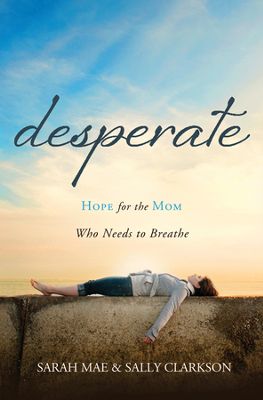Desperate
/The word "desperate" comes to mind often these days. There are a number of reasons.
This winter’s weather, for many of you. It seems there’s a new storm on the way every few days. Every plan made feels subject to cancellation, and I see a lot of moms in supermarkets with that desperate look in their eyes.
Then there are the conversations with my daughter, whose two-year-old is being very two. And it’s wearing his mother down. Yep. Desperate. That would describe many a day with that charming little whirlwind of a boy. And his two sisters.
In the midst of this long winter for weary moms, I’m preparing to speak at a local Mom to Mom. They haven’t met for a month now. Three “snow days” bled into school vacation week, and I suspect there are more than a few moms feeling desperate.
All of this—and much more—is why I’m so glad Sally Clarkson and Sarah Mae Hoover wrote Desperate: Hope for the Mom Who Needs to Breathe.
Sarah Mae is a young mom with three small children and Sally is an older (or should I say more experienced?) mom with four grown children. Each chapter begins with an exchange of notes in which Sarah is looking for help on a particular issue or with a particular stage of her parenting. Sally is able to provide hope from “on up the road apiece.” I like the dual perspective.
If you are a young mom—or an older mom—or if you know a young mom or an older mom, you really should get this book. Here’s why:
- It’s real. Sarah’s descriptions of mom-feelings, beginning with the introductory “I can’t be a mother today, Lord. I’m just too tired,” are honest, authentic, and written from the heat of the battle. They help moms sigh with relief: “Phew! I’m not the only mom who feels this way.”
- It recognizes the depths to which being a mom can sometimes send us. Sarah has struggled with depression, and she writes about it with raw authenticity. And Sally responds with heartfelt encouragement both practical and Scriptural.
- It reminds us how much we moms need each other. We were not meant to do this mom-job alone. God knew what He was doing when He provided the Titus 2:3-5 model of older women teaching and encouraging the young women. It is the heart of our small groups at Mom to Mom, and I love the one-on-one example of this which Sally and Sarah provide.
- It points us Godward. Rather than providing parenting formulas or models of mothering perfection, Sally gently and wisely steers Sarah away from perfectionistic mom-models back to our Perfect and All-Powerful God. She encourages Sarah to trust her own God-given instincts about herself and her family, relying on His Word and His power and help and strength rather than searching for the perfect parenting formula.
One caveat: I am so grateful for the transparency with which the very real problem of depression is addressed. And Sally’s responses to Sarah are full of empathy as well as practical and Scriptural encouragement. But I wish they had been clearer about the need for professional help in some cases. Moms need to draw on a wide range of resources for this very prevalent problem, and I wouldn’t want moms who need this kind of help to miss it.
Bottom line: This book lives up to its subtitle: “Hope for the Mom who Needs to Breathe.” Read it. And breathe.








 It’s happened again. The Light. Just showing up when and where I least expect it. I’ve written before—in past Christmases, I think—about that “certain slant of light” that sneaks across the nativity set on our mantle on certain early mornings when the sun shines here in Wisconsin.
It’s happened again. The Light. Just showing up when and where I least expect it. I’ve written before—in past Christmases, I think—about that “certain slant of light” that sneaks across the nativity set on our mantle on certain early mornings when the sun shines here in Wisconsin.
